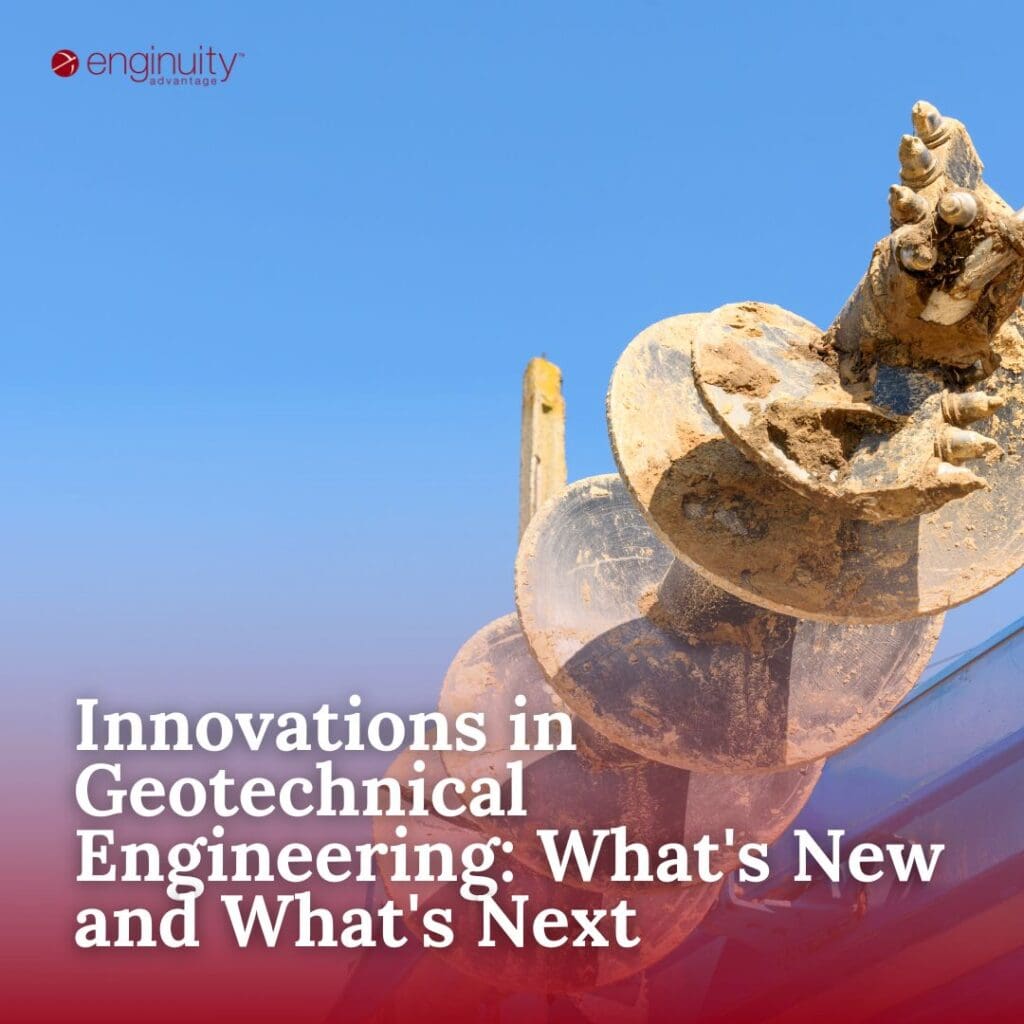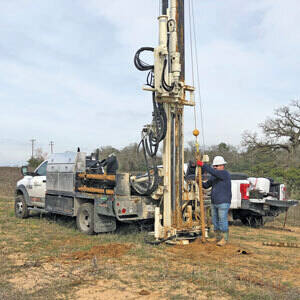Why All About Geotechnical Engineering Matters in Today's Infrastructure Development
Why All About Geotechnical Engineering Matters in Today's Infrastructure Development
Blog Article
The Relevance of Geotechnical Design in Resolving Ecological Obstacles and Enhancing Building And Construction Safety And Security
Geotechnical engineering offers as a cornerstone in the junction of environmental stewardship and building and construction safety, giving crucial understandings into the habits of dirt and rock under various problems. By implementing calculated website investigations and tailored reduction actions, geotechnical engineers play a crucial duty in protecting both human lives and eco-friendly integrity.

Role of Geotechnical Design
Geotechnical engineering plays an important role in the style and construction of facilities by addressing the habits of dirt and rock products under various problems. This area of engineering is vital for understanding the interaction between frameworks and the ground, which includes identifying the load-bearing ability of dirt, assessing stability, and forecasting possible settlement or failure.
Geotechnical engineers are in charge of conducting site investigations, which include tasting and screening dirt and rock to collect information on their physical and chemical buildings. This details is important for developing structures, preserving wall surfaces, and various other earth-retaining structures that guarantee safety and durability. Geotechnical design educates the option of ideal building and construction approaches and products, therefore decreasing threats linked with dirt actions.
In addition, the assimilation of geotechnical design concepts right into metropolitan planning and environmental management is crucial for addressing challenges such as ground contamination and groundwater management. By understanding geotechnical variables, designers can establish sustainable services that enhance the resilience of framework versus all-natural dangers, while likewise promoting ecological stewardship. Inevitably, the function of geotechnical design is crucial for achieving secure, resilient, and ecologically conscious building methods.
Soil Erosion Mitigation
Dirt erosion positions a significant threat to both ecological stability and framework stability, influencing around 24 billion lots of abundant soil lost each year worldwide. This sensation is intensified by aspects such as logging, urbanization, and inadequate agricultural methods. Geotechnical design plays a critical duty in developing efficient dirt erosion mitigation approaches that protect both the atmosphere and construction jobs.
One strategy entails the application of disintegration control methods such as greenery growing, which maintains dirt through root systems. Furthermore, the building of maintaining wall surfaces and balconies can efficiently minimize surface overflow and secure at risk locations from erosion. Proper drain style is likewise critical; it reduces water build-up and guides excess overflow away from important frameworks.
Moreover, geotechnical engineers employ soil stabilization methods, such as the application of geotextiles and naturally degradable floor coverings, to boost dirt communication and stop destruction - geotechnical specialist. Normal surveillance and evaluation of erosion-prone sites enable timely treatments, making certain long-lasting sustainability. By integrating these strategies, geotechnical engineering not only mitigates the effects of soil erosion however also adds to the resilience of infrastructure versus environmental obstacles, eventually promoting a safer and a lot more sustainable developed atmosphere
Groundwater Security Methods
Groundwater functions as an important resource for alcohol consumption water, agriculture, and commercial processes, making its defense crucial for environmental sustainability and public health. Efficient groundwater protection approaches are important in reducing contamination threats and guaranteeing the long life of this resource.

Regular tracking of groundwater top quality is likewise crucial, allowing very early discovery of contamination sources and promoting timely remediation initiatives. Using sophisticated modern technologies, such as geophysical studies and remote noticing, help in recognizing potential dangers to groundwater gets.
Furthermore, public education and stakeholder involvement are crucial, promoting neighborhood assistance for groundwater defense initiatives. geotechnical engineer description. By combining regulatory steps, technical innovations, and area participation, we can produce an extensive framework that safeguards groundwater resources while advertising sustainable growth and construction methods
Landslide Threat Management
Landslides present substantial dangers to both human safety and security and framework, making reliable danger administration methods necessary. Geotechnical design plays a critical duty in recognizing, examining, and mitigating landslide dangers. An extensive understanding all about geotechnical engineering of slope stability, dirt auto mechanics, and hydrology is crucial for developing reliable risk management strategies.
The first action in landslide threat administration involves thorough website examinations, which include geological mapping and dirt screening. These investigations help designers examine the potential for landslides by recognizing essential aspects such as slope angles, dirt structure, and water content. Making use of sophisticated technologies such as remote picking up and geophysical surveys can enhance the precision of these assessments.
As soon as risks are recognized, suitable reduction procedures can be executed. These might include design services such as preserving walls, water drainage systems, and slope stablizing techniques. In addition, keeping an eye on systems should be developed to detect indications of ground activity and modifications in water degrees, allowing for aggressive interventions.

Enhancing Building Security
Building and construction sites commonly offer a myriad of hazards that can endanger employee safety and security and task integrity. Geotechnical engineering plays a vital duty in boosting building and construction safety by offering vital understandings right into subsurface problems. Via thorough dirt and rock evaluation, geotechnical designers can recognize potential risks, such as soil instability, groundwater issues, and seismic vulnerabilities, which might compromise the safety of construction tasks.
Implementing geotechnical solutions, such as proper foundation style and making use of keeping structures, mitigates these risks significantly. These solutions not just make certain the security of the structures being built but additionally develop a much safer working atmosphere for construction personnel. In addition, strenuous tracking and evaluation of site problems throughout the building process are crucial. Making use of innovative innovations like ground-penetrating radar and inclinometer systems enables real-time information collection, enabling for prompt treatments when risks are detected.
Furthermore, promoting a culture of safety through training and adherence to established safety procedures even more improves building site security. By integrating geotechnical experience right into the preparation and implementation stages, building jobs can accomplish higher safety standards, ultimately protecting workers and ensuring successful task conclusion.
Verdict
In final thought, geotechnical design serves as an essential self-control in promoting and dealing with ecological challenges building and construction safety. With effective dirt erosion mitigation, groundwater defense techniques, and landslide danger monitoring, geotechnical engineers contribute to the advancement of resistant infrastructure.
Geotechnical engineering serves as a foundation in the junction of environmental stewardship and building security, giving critical insights right into the actions of dirt and rock under various conditions. Geotechnical engineering notifies the choice of proper building and construction approaches and products, thereby reducing risks connected with soil habits.
Geotechnical engineering plays an essential duty in creating reliable dirt disintegration reduction approaches that safeguard both the environment and construction jobs.
Furthermore, geotechnical engineers employ soil stabilization techniques, such as the application of geotextiles and biodegradable mats, to enhance dirt communication and stop destruction. With detailed dirt and rock analysis, geotechnical engineers can recognize possible dangers, such as soil instability, groundwater problems, and seismic vulnerabilities, which may compromise the safety of construction tasks.
Report this page